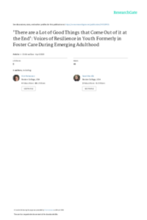Abstract
Emerging adulthood, the developmental stage between ages 18 and 25, presents unique barriers to former foster youth, who experience higher rates of unplanned pregnancy and homelessness and poorer educational attainment than their peers during this time. This study uses interviews with 20 youth formerly in foster care who exhibit better-than-average outcomes to explore contextual aspects of resilience during emerging adulthood, elucidating how both relational and organizational support contribute to their resiliency. Implications for social work policy and practice are discussed.

